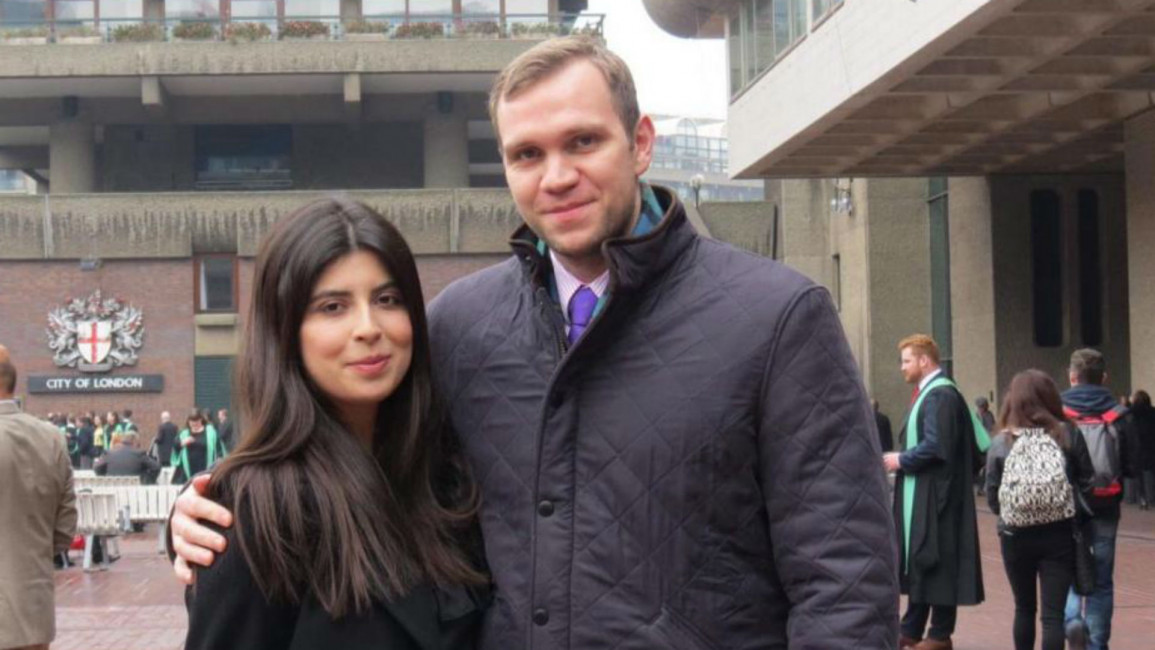
The UAE knows Britain won't seriously act over Matthew Hedges jailing
The sentencing of Matthew Hedges to life imprisonment over accusations of spying in the United Arab Emirates has outraged many.
Hedges, a 31-year-old PhD student from Durham University, was detained at Dubai airport on May 5 after conducting research on the UAE's domestic and foreign security policies since the Arab uprisings in 2011.
After his arrest, he was kept in solitary confinement for six months in poor conditions, which included being forced to sleep on the floor, before being eventually charged in October.
Hedges' wife, Daniela Tejada, raised concerns that the British Foreign Office was brushing his case under the rug over fears that it would disrupt their economic and security relations with the UAE. Since his arrest, Tejada said on BBC Radio's Today programme that the FCO were "putting their interests with the UAE above a British citizen's rightful freedom and his welfare and his right to a just and fair trial".
Throughout his confinement, she has sought support from the Foreign Office, who she says consistently brushed her off, claiming it was neither their job nor duty to help her. They also attempted to exert pressure on her not to speak to the press, in the hope the story could be buried. It wasn’t until she went public about Hedges' detention, and public pressure subsequently grew, that Foreign Secretary Jeremy Hunt became more responsive.
Alongside the fears for Matthew and his family, one should also consider the growing likelihood that this will happen again, as well as the fact that our own domestic policies under the guise of counter-terrorism are taking us in a strikingly similar direction in the UK.
A recent UN report on the UAE's human rights abuses shed light on how the country uses accusations of terrorism to carry out arrests, forced disappearances, detain people in secret prisons and carry out torture in order to force individuals to confess to the charges levelled against them.
 |
The protection of researchers, students, academics and all those wishing to work within fields that require research into sensitive subjects is being severely threatened |  |
Deputy Middle East director at Human Rights Watch Michael Page said the UAE "invests considerable time and money painting itself as a progressive and tolerant country, but Hedges' case shows the face of an autocratic government with a fundamental lack of respect for the rule of law". The growing tendencies by the state are to shut down and censor any criticism, as well as potential dissent.
Sound familiar?
The UK's own hand in extraditions, rendition, the use of secret courts and evidence, as well as the implementation of the Prevent programme into law, shows similarities in the securitisation process and the overall dismantling of civil liberties, freedoms and adherence to the rule of law.
Furthermore, the protection of researchers, students, academics and all those wishing to work within fields that require research into sensitive subjects is being severely threatened.
Under the Counter-Terrorism and Security act, Prevent has left many across the education sector fearful of carrying out their research for fear of being flagged to the authorities as becoming "radicalised". Just recently students at the University of Reading were told to tread carefully while reading an essay entitled Our Morals: The Ethics of Revolution, by Professor Norman Geras, because it had been flagged up as "sensitive" under Prevent.
Advice to students included not leaving the text lying around publicly or accessing it on personal devices so that they wouldn't risk being referred to "de-radicalisation" programmes.
To make matters even more dangerous for those working in academic, journalistic, humanitarian and legal fields (to name a few), the Counter-Terrorism and Border Security Bill is set to criminalise people further over the content that they view online.
It would no longer require the "three clicks" rule in relation to terrorist material online; individuals could find themselves in prison for a single visit. The National Union of Journalists (NUJ), stated that some of the proposals could "gravely endanger legitimate, public interest, media reporting of terrorists and terrorism", and "create harsher penalties and new offences that criminalise information-seeking and freedom of expression".
Fundamental rights including freedom to seek and receive information which are protected by Article 10 of the Human Rights Act are being rolled back in the name of so-called security.
This is in addition to travelling to the Home Office's "designated areas", which could mean 10 years of imprisonment. Indeed, the new bill seeks to engrain the same practices, supposedly for our own protection. Stripping those detained at borders of their ability to access legal representation for up to an hour so that their questioning can take place without "influence", and even when such individuals can speak to a solicitor, state forces have the power to listen to the entire conversation.
With the UK building its image as a leading example in counter-terrorism, is it a surprise that the UAE can so confidently condemn a British citizen to life imprisonment despite the numerous shortcomings in what should be a court of law?
Hedges' case is an example of the UK being confronted with its own policies and practices that it has exported world-wide. For many years, the UAE has served as one of the biggest arms buyers for the UK and an "ally" in the war on terror. Their trade "relationship" - which has trumped any criticism of the nation's human rights abuses in the past - also seems to include the lives and freedoms of British citizens.
 |
This is, to paraphrase Malcolm X, a case of Britain's chickens coming home to roost |  |
Matthew Hedges' interrogation, his five-minute trial with no legal representation, and having to sign a confession document in a language he neither speaks nor reads, are all reminders of the fact that the practices of a growing securitised state are void of any justice, application of due process or regard for the rule of law. Yet none of these practices should be a surprise. Political opponents, trade unionists, women and LGBT right groups, migrant labourers and many more have long suffered at the hands of the Emirati state.
British officials have however continued to strengthen political, economic, military, and diplomatic ties. This is, to paraphrase Malcolm X, a case of Britain's chickens coming home to roost.
It is therefore also important that a growing number of people are responding across British academia. For example, Hedges' supervisor from Durham University, Professor Clive Jones, has indicated that the University would have to review whether students would be allowed to carry out research in the UAE anymore, and the University of Birmingham UCU passed a motion refusing to accept work in their employer's Dubai campus in solidarity.
The motion noted, in response to the university’s refusal to take seriously the union's concerns over Hedges and LGBT rights in the Emirates, that:
"UCU members at the University of Birmingham are outraged at the sentence of Matthew Hedges and the university's refusal to address the serious issues we have raised regarding its campus in Dubai."
Hedges must be brought home and reunited with his loved ones as soon as possible. Simultaneously, however, it is more than time for the British state to end its relationship with oppressive regimes across the world, and stop putting the lives of millions in danger in order to strengthen its economic and political stature.
As Hedges' case reaffirms, there is no freedom, no liberation, no justice in isolation. Either we all get free, or we all bear the consequences.
Malia Bouattia is an activist, a former president of the National Union of Students, and co-founder of the Students not Suspects/Educators not Informants Network.
Follow her on Twitter: @MaliaBouattia
Opinions expressed in this article remain those of the author and do not necessarily represent those of The New Arab, its editorial board or staff.




